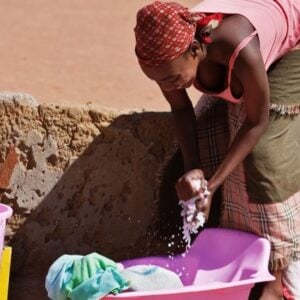A two-day High-Level Forum on Defying Drought (D2) in West Africa concluded in Ouagadougou with strong commitments to tackle the growing challenges of drought in the region against the backdrop of climate change and population growth. Senior policymakers from Burkina Faso, Chad, Mali, Mauritania, Niger, and Senegal, alongside experts from Morocco, Brazil, and various development partners, came together to share best practices and design a roadmap of policy actions to strengthen drought resilience across the Sahel.
One of the major outcomes of the Forum was the signing of a Memorandum of Understanding between the World Bank Group, the Government of Burkina Faso, and the International Institute for Water and Environmental Engineering (2iE) to establish the Africa Water Center (AWC). The Center, to be hosted at 2iE in Ouagadougou, will act as a regional hub for innovation, partnerships, knowledge exchange, and capacity building in the water sector.
The urgency of this initiative stems from intensifying climate pressures in West Africa, where population growth and declining per capita water resources are straining supply-demand balances. Over the past five decades, extreme droughts have increased by more than 230 percent, heavily affecting economic growth in developing economies. In some Sahelian nations, annual growth could decline by as much as six percent by 2050 if drought risks remain unchecked. The AWC will provide technical expertise, training, and institutional support to strengthen early warning systems, improve water planning, and coordinate drought management across the region.
Leaders at the Forum emphasized the importance of regional solidarity and innovation. Burkina Faso’s Minister of Economy and Finance, Dr. Aboubakar Nacanbo, underlined that drought threatens not just the environment but also economic stability, public health, and peace, and welcomed the AWC as a beacon for sustainable water management. Professor El Hadji Bamba Diaw, Director General of 2iE, described the Center as a milestone in building resilience, socio-economic development, and South-South cooperation, bringing together science, technology, and practical solutions tailored to African realities.
World Bank leaders also highlighted the significance of the initiative. Ousmane Diagana, Vice President for Western and Central Africa, stressed the need for knowledge, cooperation, and decisive action to transform drought from a threat into an opportunity for resilience. Juergen Voegele, Vice President for the Planet Vertical, emphasized that water security underpins global economies, and innovation from this initiative will create jobs, foster economic growth, and secure a more sustainable future worldwide.
The Forum, convened by the World Bank Group in partnership with the Government of Burkina Faso and 2iE, marked the launch of the World Bank Academy’s Impact Program Defying Drought (D2). This initiative will catalyze the adoption and scaling of drought-resilience measures, providing a model for other regions grappling with water scarcity.







